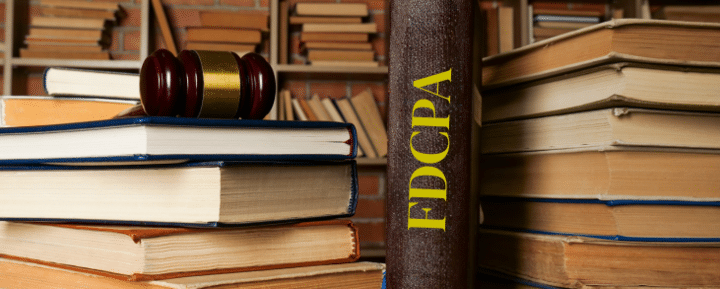If you owe a past-due debt, you may have already started receiving phone calls from a debt collection company. However, federal law dictates what debt collectors can and cannot do when communicating with you.
The Fair Debt Collection Practices Act (FDCPA) includes several important consumer protections. If a creditor violates your rights as a debtor, you can take legal action against them. Here’s what you need to know about your rights and how to sue debt collectors for FDCPA violations.
Understanding the FDCPA
The Fair Debt Collection Practices Act is a federal law that lays out what collection agencies can and can’t do. It’s important to note that these rules apply only to third-party debt collectors and buyers and not in-house collections for the original creditor.
If you’ve been contacted by a collection agency for a consumer debt, here are some key protections to know about:
- They must disclose their identity and purpose when making first contact.
- You have the right to dispute the debt.
- If you tell a collection agency to stop contacting you, they must comply.
- They cannot notify family members or your employer that you owe money.
- They can only call you between 8 am and 9 pm.
- They cannot tack on extra interest or penalties unless the original agreement allows it.
- They aren’t allowed to use physical force, harassment, abuse, unlawful threats or bullying.
- They cannot make false statements about who they are or their intention to sue.
Gathering Evidence of FDCPA Violations
If you believe that a debt collection agency is in violation of the FDCPA in your case, it’s important to gather as much evidence as possible to prove your claim.
Documenting Violations
Once you’ve been contacted by a debt collector, it’s important to keep records of all of your communications.
In most states, for example, you can legally record your phone calls with a collection agency without their consent. However, if you live in California, Florida, Illinois, Maryland, Massachusetts, Michigan, Montana, New Hampshire, Pennsylvania or Washington, you may need to first obtain consent before you start recording.
You should also hold onto any other type of communication you receive, such as letters, emails and other messages, that you may use as evidence.
If anyone else was involved in the debt collector’s violation, such as a family member or employer, take a statement about what happened, so you can include it in your complaint.
Evaluating Damages and Losses
Depending on the situation, you may be able to request certain damages from the collection agency. This may include attorney’s fees, court costs, lost wages, emotional distress and statutory damages.
Consulting with a Consumer Rights Attorney
If you’re unsure where to start with proving your case and evaluating damages, it may help to consult with an experienced debt relief attorney who can provide you with legal advice.
An experienced debt help lawyer can inform you of your rights and guide you throughout the process. They can also take over communication with the collection agency to give you some peace of mind.
Preparing to Sue for FDCPA Violations
Once you’re ready to proceed, now is a good time to consult with an experienced debt help attorney — if you haven’t already — who can walk you through the process. They can help you determine whether it’s better to sue in state court or small claims court, and they can also help you understand your legal rights and options.
They’ll also guide you throughout the legal process, from initiating the lawsuit and serving the collector to the discovery phase, possible negotiation and settlement and, ultimately, trial.
Filing a Lawsuit Against a Debt Collector
Once you’ve consulted with an attorney who specializes in debt about your situation, the next step is to initiate the lawsuit with the appropriate court. Then, you must serve the debt collection agency, typically through a process server.
The collector will have a certain amount of time to respond to your complaint. Here are the next steps in the process.
Discovery Phase
During this phase of the legal collection process, each party in the lawsuit will gather information from each other to prepare for trial or to negotiate a debt settlement.
At this point, you may share your evidence that the agency violated your rights under the FDCPA. The debt collector may share other details related to the debt and its defense.
Negotiation and Settlement Opportunities
In some cases, it may make sense to negotiate a settlement instead of going to trial. This may be particularly beneficial if you’re concerned that your evidence may be insufficient to guarantee a judgment against the debt collector.
During this part of the process, you may attempt to negotiate damages related to the violation or to the amount you owe to the collection agency. An experienced attorney can help you with this process.
Trial
If you choose to go to trial instead of settling out of court, you’ll start with opening arguments. Then, both you as the defendant and the collector as the plaintiff will present your cases to the judge in Court.
If you have witnesses, you may call them and ask questions that allow them to present evidence to support your defense of your debt case. The plaintiff or debt collection lawyer representing the creditor may then cross-examine the witness. After both parties have presented their case, you’ll finish with closing arguments.
At the end of the trial or within a couple of weeks, the judge will make a decision about the case.
Potential Outcomes and Remedies
The potential outcome of your debt lawsuit will ultimately depend on the details of the r complaint and your answer. With that said, here are some potential remedies.
Financial Compensation
According to the FDCPA, you can collect up to $1,000 in statutory damages from the collection agency if you can prove they violated the federal law. This is true whether or not you experienced any other harm.
That said, you may also be able to receive financial compensation for other damages, such as:
- Lost wages
- Medical bills
- Physical or emotional distress
- Wage garnishment recovery
- Attorney fees
Injunctive Relief
On top of monetary damages, the court may also grant you injunctive relief. For example, the debt collector may be forced to stop calling you or sending you other communications. It may also be prohibited from contacting other people, such as your family members, friends, employer and other third parties.
Impact on Debt Collection Practices
The court may also require the collection agency to audit its debt collection practices and make changes to comply with the FDCPA.
Alternatives to Lawsuits
If you’re not sure you want to go through the process of suing a debt collection agency, consider reporting the collector to a government agency, including the Federal Trade Commission (FTC) and the Consumer Financial Protection Bureau (CFPB).
You can also file a complaint with your state attorney general, who can also investigate whether they broke state laws.
Alternatively, you can use the violation as leverage in debt settlement negotiations. This is particularly worthwhile if any potential damages you gain from a lawsuit won’t be enough to cover the amount you owe.
Talk to a Lawyer if a Debt Collector Violates the FDCPA
Although you can technically sue a debt collector on your own in small claims court, the process can be incredibly stressful, not to mention confusing.
As a result, it’s a good idea to work with an experienced attorney who understands debt collection practices and the laws that safeguard your rights. When a debt collector violates your rights, an attorney can walk you through whether it’s appropriate to file a lawsuit and which steps you can take to prepare your case. For debt help contact the Tayne Law Group by calling (866) 890-7337 or filling out our short contact form to get a free phone consultation and learn about your debt help options. Your information is never sold or shared.





